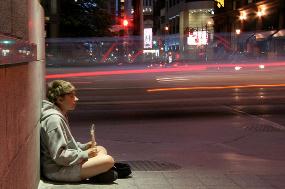
Ward 27 Toronto Councillor Kristyn Wong-Tam. Credit: Xtra file photo

Michael Shapcott, director of affordable housing and social innovation at the Wellesley Institute. Credit: wellesleyinstitute.com
A group of councillors is planning a last-ditch effort to convince their colleagues to use some of the city’s $232 million surplus to prevent “drastic” cuts to emergency shelter and homeless beds during final 2013 budget debates this week.
Ward 27 Councillor Kristyn Wong-Tam says several progressive councillors are discussing ways to save services before the budget is put to a final vote Jan 17.
“We are very aware that there will be a housing crisis in the city of Toronto because of the provincial downloading and restructuring of funding and the cancellation of homelessness prevention programs,” she says. “We are essentially allowing the province to download on the city and not take an active stand on that.”
The provincial Liberals recently announced that the Community Start Up and Maintenance Benefit ends in 2013. The $114 million benefit supports 200,000 individuals a year, including youth living in unhealthy or abusive home environments. In its place, Ontario has promised to give $62.6 million to municipalities so they can address emergency housing at a local level – but this is only half of what the province currently allocates for the benefit.
That translates to a reduction of $7.8-million from the Homelessness Prevention Service compared to 2012, Wong-Tam says. “That’s significant. These are programs that help people teetering on the brink of homelessness. [The money] is used to keep people in their housing to prevent them from hitting the streets.
“So we need to figure out how to gap that program,” she says. “The city can come up with the funds, $7.8 million, to top up these programs.”
The money could also come from assessment growth, much like the $6.8 million package of spending aimed at a variety of programs presented at executive committee Jan 10, which, she adds, was taken from the budget for emergency shelters and housing.
“It’s grossly unfair of the mayor at the budget committee; [he] will pick and choose what to fund and not fund those who are most at risk,” she says.
Wong-Tam also expects it to be a tough sell to other members of council, mainly because topping up the cuts will be seen as an acceptance of the provincial download, she says. “We are working on getting 23 votes on the floor.”
Wong-Tam says chipping away at money for homelessness prevention programs means Toronto will face much higher costs in the long run.
“People are literally stuck and forced onto the street, which becomes a different problem with additional costs,” she says. “A new layer of costs comes into effect. Emergency rooms will be full. People become ill on the street. There is the cost of increased policing because people run out of options and turn to a life of crime to make ends meet.
“This is really shortsighted political leadership. People living on the street are more expensive, and we have a moral obligation to ensure that people are housed.”
Ward 18 Councillor Ana Bailão says she fully anticipates councillors will put more money into housing, beyond what the budget currently provides, but she also says the city’s hands are tied.
“These are not our cuts. The provincial government has changed the formula,” she says. “The big problem is the reserves are depleted. We really need to have a serious conversation with our provincial and federal governments to say we cannot continue to expect the taxpayer to fund housing from our property taxes.”
Despite the lack of funds, Bailão vows people will not be left out in the cold. “The question is how will we deal with this issue next year now that our reserves are depleted,” she says.
Michael Shapcott, director of affordable housing and social innovation at the Wellesley Institute, says Toronto’s 2013 budget is taking an already inadequate system and making further cuts.
“It is generally a terrible budget,” he says. “These cuts affect certain groups more than others.”
He says Toronto’s Shelter, Support and Housing Administration budget is being cut by $128 million dollars.
The city’s proposed budget projects there will be 41,172 fewer hostel bed nights available in the city’s homeless shelters in 2013. Shapcott says this decrease in beds runs contrary to what is happening on Toronto’s streets.
“In the real world, homelessness is on the increase, he says. “But in the fictional world of the Toronto budget, they are pretending that homelessness is going down. They’re saying that this efficiency savings is not actually going to result in any problems. These are services provided to the most at-risk people in the city.”
Shapcott thinks the city is evading its responsibility by shifting the blame to the provincial and federal governments.
“Toronto is the largest city in Canada. The mayor should be at Queen’s Park screaming at the top of his lungs, saying, ‘Don’t you dare cut these programs because it hurts the people of Toronto,’” he says. “Instead we have a mayor who just accepts it and maybe even agrees with the federal and provincial decisions to cut funding.
“They can’t just dump funding cuts onto us and tell us we have to pick up the bodies off the streets.”
Many people who couch surf or sleep on the streets remain invisible, Shapcott says. “All the indicators that say homelessness is actually going up are pretty common-sense indicators,” he says.
Another sign of Toronto’s deepening affordable housing crisis: the latest data from the Daily Bread Food Bank shows there has been a steady increase in food bank visits since 1995. In 2012, there were 1,123,550 in the GTA, an 18 percent increase since 2008.
The cuts also coincide with an exploding need for housing assistance in Toronto. Fourteen youth shelters in the city have a total capacity of 525 beds. But a recent report from Covenant House, a downtown youth shelter, estimates that 1,500 to 2,000 youth are homeless on any given night in Toronto. I Alex Abramovich, one of the only Canadians studying queer youth homelessness, told Xtra in December that 25 to 40 percent of homeless youth are lesbian, gay, bisexual or trans, and “it is a crisis that is definitely on the rise.”
“For certain groups the current homeless system is already inadequate,” Shapcott says. “The city is not providing enough beds. It’s not providing the right amount of supports and services, and certainly queer youth fall into that category.”
One of the main reasons the shelter system is so full, and people are staying longer in homeless shelters, is because Toronto doesn’t have enough affordable housing, Shapcott says. The wait list for affordable housing has set a new record every month since 2008.
As of November, he says, there were 87,638 households on the waiting list, representing 162,000 people. That’s an all-time record.
In 2009, the city set out a 10-year plan that included 1,000 new affordable rental units each year, he says, noting that modest target will also be slashed. “The 2013 budget calls for a 50 percent cut on what is already inadequate for affordable housing. The city will be lucky if it gets 500 or even less new homes in the coming year.”
“Because queer and trans people already have a difficult time getting housing, this means they will be pushed even further to the margins, to the point they will lose all hope of finding a decent place to call home,” he says.
Activists are planning a “budget breakfast” at 8am Jan 15 at Toronto City Hall to discuss the cuts. For more information, see the Facebook page.

 Why you can trust Xtra
Why you can trust Xtra


